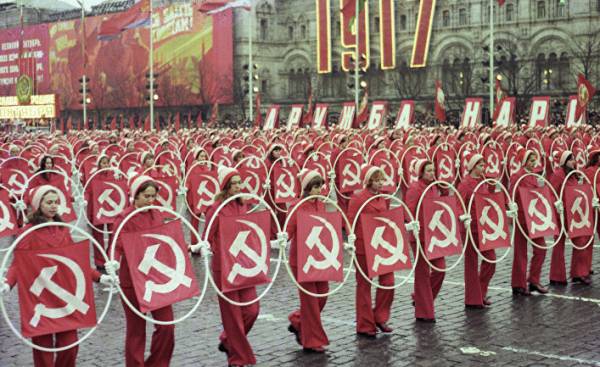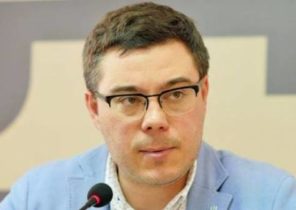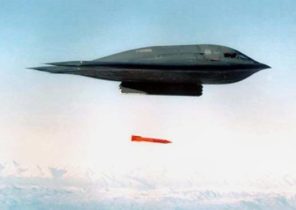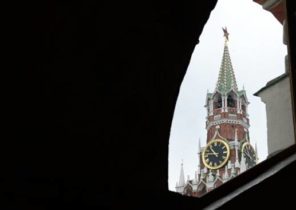
At dawn on 2 January 1948, when the temperature in Moscow fell to −20º, two Argentine diplomat departed from the capital hotel to airport with bags and two large suitcases. Only one of them managed to sit in the old “Douglas” flying to Prague, take one of the suitcases. The second passenger was not allowed to pay for overweight dollars, and he had to wait for the next day. The flight was delayed two hours, which caused great concern to the Argentine diplomat. They were flying in those old ships, where the passengers were with their Luggage.
As said by the diplomat, in the afternoon, when the plane had already crossed the border of Czechoslovakia, his thoughts were interrupted by a rhythmic tapping coming from the suitcase. The stewardess noticed this and went to warn the pilot. “I realized that my cover was blown. I quickly pulled the key from the suitcase and opened it.” Under goggles two military and three civilian, were flying along with Pedro Conde, Magdaleno (Magdaleno Pedro Conde), a work representative of the Embassy of Argentina to the USSR, out of a suitcase got poluzatonuvshy Spanish immigrant Jose Yokota Albertos (Tuñón José Albertos), which the Argentine diplomat was trying to get out of a “socialist Paradise.”
In the further course of the story we learn how this story ended, and what was the fate of each of her characters. Now we look at what happened the year before when the Secretary-General of the trade Union of workers of confectionery and bakeries Pedro Conde, Magdaleno learned that the then President Juan Domingo Peron sends it to Moscow as part of the Argentine delegation, which was to reopen the Embassy of Argentina to the Soviet Union. Our two countries at that time had just restored diplomatic relations. Joy Pedro Conde, Magdaleno was boundless: he was driving in the country of victorious socialism.
Pedro Magdaleno came out of the very midst of people’s environment, which relied Peronism. “In 16 years he’s barefoot, came to the capital, where he found work as a Baker. He was raised by life itself, and he was ready to do a lot for their ideals,” he told Infobae his granddaughter Alicia Mabel Conde (Alicia Mabel Conde), which collects information about the film, the main character by her grandfather. She also hoped to republish his book, which is now not available. “Why Spanish immigrants fleeing from the Soviet Union in the suitcase?” (“¿Por qué en baúles huyen los asilados españoles en la URSS?”) ruthlessly denounces the Stalinist regime, betrayed the interests of the working class. This book was published in 1951, 20 years before the publication of “the GULAG Archipelago” by Alexander Solzhenitsyn.
When Peron came to power, Conde was the Socialist party. Like many other supporters of the various Marxist currents drawn by the innovative initiatives of the new government. “I was peronista out of gratitude, now I Peronist beliefs” — he will say later.
On 6 February 1947 the government approves new rules on foreign policy by establishing embassies the position of “workers ‘ representatives” so that they “represented abroad by the workers of Argentina” and came back “with the acquired knowledge and experience needed to build a great Argentina”.
Because Conde, Magdaleno has successfully completed the courses of the foreign Ministry of their country for future diplomats, the decision was made to send him to the Soviet Union. Nothing better could not come up with. Finally he will visit the cradle of socialism, will examine the labour laws and working conditions in industry and agriculture.
But soon, too soon, he will realize that the so-called “real socialism” was “the most anti-proletarian in the land.” Held less than a year, and Conde, Magdaleno will make a bold attempt to rescue from this “big prison” of the two Spanish immigrants, with whom he became friends and whose fate was important to him.
Surprisingly, this story is very little known in our country. Although in fairness I must say that the trade Union of bakers of Buenos Aires (UPPA), which belonged to the Conde Magdaleno, in December of last year called him a name belonging to the Union hotel. But his courageous act and written a book almost completely sunk into oblivion, except for a few articles in the local and foreign press.
Strictly speaking, a work messenger Peron was the victim of the cold war, during which each of the parties has systematically brought the truth to be sacrificed on the altar of their ideology. Center for democratization and development in Latin America (CADAL) wants to revive the memory of this man during his constant denunciation of state terrorism committed behind the iron curtain under Communist dictatorships.
The trip to the Soviet Union
When condé Magdaleno arrived in the proletarian Paradise, I was extremely surprised that the Soviet authorities refused to give him approval on the grounds that his passport was written the position of “worker representative”. Had to delete it from the passport, and only then he was allowed to enter.
Conde, Magdaleno, his wife Alicia Masini (Masini Alicia) and three sons arrived in the USSR in April 1947, together with the newly appointed Ambassador Federico Cantoni (Cantoni Federico).
The arrival of the Argentine delegation in the Soviet Union was not accompanied by any events, although it was about the restoration of diplomatic relations after a break of many years. “For the Soviet people and our arrival went unnoticed,” he says then Conde, Magdaleno. And if in Buenos Aires the Soviet delegation were placed in the hotel Alvear, the Argentine diplomats in Moscow had to huddle in a single room of a seedy hotel.
“The main work of diplomats in Moscow was to get food,” — wrote in his book the worker representative.
The next unpleasant fact was the refusal of public officials from meeting with him. The Chairman of the all Vasily Kuznetsov said that he needs to decide on the meeting in the foreign Ministry. And — silence. The unions of bakers also refused to accept it. Conde was not permitted to visit the library and workers ‘ clubs, Union clinics, kindergartens, vocational schools and other similar institutions, in which Conde with his friends often frequented in Argentina. They were sure that the USSR their work was much better established. “My only desire was to learn how workers work, eat, sleep, spend their free time”.
He soon found out that labor laws in the Soviet Union existed only on paper, because workers could be dismissed in the usual order. All the legislation was subordinated to “the hidden branch of government which writes the laws on labour, and then to use it as a political weapon, but in order to perform” in his country, writes Conde, Magdaleno. Never-ending work day, overtime unpaid work in the name of socialist competition, congestion in transport and in homes, card for goods and products, small salaries, the pensions, not allowing it to stop working, and “irritating inequalities” between workers.
Conde, Magdaleno will be able to overcome all obstacles thanks to the help of Spanish immigrants who worked in the Embassy of Argentina as interpreters and acquainted him with the reality that the authorities tried to hide from him.
“I have been in the dining room of an aircraft factory No. 43, where he saw something hard to believe. The workers were given food in accordance with their professional category. Those who earn more, give more varied food and more”. Another plant I saw as a “difficult and hazardous work are women, particularly in the blacksmith and smelter”. Night work by women is prohibited in Argentina, but not in the USSR. The only thing he found equality of men and women, it is over-exploited.
Soviet trade unions served the interests of employers and not workers. “It seemed that their only task was to remove obstacles standing in the way of state capitalism, giving permission for the abolition of labour laws, although the meaning of trade Union activity was just the opposite — he writes. — The unions played the role of overseers, acting in the interests of the employer-the state.”
1 May, he experienced another shock: a workers ‘ demonstration on red square, passing under the strict control of the internal Affairs bodies. Joseph Stalin appeared briefly and disappeared again behind the Kremlin walls, accompanied by guards, not even talk to people. This Conde concluded: “Our people are properly nourished and gives vent to his feelings, says what he thinks. Completely different is the situation in a society where all are obliged to sing the praises of the beloved Father of the nation, although from all this sick…”
The purpose of writing the book
“My grandfather was very brave and had great mental powers, though he graduated only two classes of primary school, when I came to Buenos Aires, reported Infobae Alicia Conde. My grandmother convinced him to finish high school and acquire a profession. She knew several foreign languages, was his assistant and translator. A book his grandfather wrote with her grandmother, who kept a diary of his stay in the USSR.”
In the introduction Pedro Conde, Magdaleno writes: “I will try to explain how through subtle and deceitful propaganda to the world represent a Paradise for the workers that in reality is nothing more than a huge prison with hard labour, hunger and horror. A big mistake to believe that the Bolshevik regime frees the masses from exploitation, providing them with the best conditions of life and work. If you look at the Soviet Union from within, he will not appear before you neither ideological force nor the public welfare, but a prison with forced labour, which is worse than any of the existing in the capitalist countries. Warm attitude on the part of some workers can only be explained by fairy tales, invented in the conditions of absolute secrecy from the outside world to which they had been led to believe”.
And further warned: “Those who claimed that the Soviet Union is an ideological threat that must be isolated, only helped him to dissociate itself from the rest of the world. They provided an invaluable service to those who, hiding behind a screen pseudopolitical propaganda, created the most anti-people regime of all time.” Many of those who are trying to justify all this threat from an external enemy. But Conde recalls that it has been thirty years after the October revolution of 1917. “Disgusted with the shameless cynicism of the Bolsheviks, who, hiding behind a screen of lies, calls on other countries to provide all the freedoms and living conditions for the proletariat, which they own hands destroyed in their country”.
But “the Soviet people are so isolated,” he can’t even imagine what happens outside his “Bolshevik of the world.” Because he never knew anything better, you may believe the lie that enjoy the privileges. All controlled and constantly moving, boundary, correspondence.
Begging and juvenile delinquency
Upon arrival in Moscow he was struck by the huge number of beggars on the streets, sharply contrastirovania with the high life of a small number of people belonging to the ruling elite. In this regard, he writes: “still can’t believe that there is such a big difference between communism, which I imagined, and the fact that I see”.
Gradually reveals different false fabrications of the Soviet regime. One of them is the mechanization of agricultural labor. Actually — poor harvests, resulting from forced collectivization, the constant food shortages and hunger guaranteed.
“And I do not believe that in other countries life better, he explains. — But I resent the hypocrisy of the Communists, to impose to his people the inhuman conditions of life and work, while in other countries they refer to themselves as the main guarantor of freedoms and the demands of the proletariat, which the people and could not dream”.
In one of the chapters of the book called “it looks like Soviet capitalism”, condé gives a tight description: “Even though the propaganda calls anti-capitalist Soviet regime, the Soviet regime is a giant capitalist monopoly, the revenues from activities which in the absence of the opposition receives a small number of preference shareholders, that is, the party and the military elite. They are the masters of life and earth. In the middle Ages”.
Workers are subjected to ruthless exploitation. The sense of camaraderie is absent due to “poverty and fear, which make people indifferent to the pain of others, cruel to subordinates and obsequious towards superiors”.
In horror he discovers that the streets are full of children begging and committing crimes: “They consume everything in their path to satisfy the accumulated hunger. Beg, steal, do corruption and can even kill for a loaf of bread. The police could with all of them to handle, but because among them are five and six years, it is considered that better now not to touch. Those who survive, grow up, then they will need to take to use on the work.”
Shy mode and the Argentine Communists
“The antics of an unscrupulous regime, which is called Bolshevism is no surprise — says the worker representative. — I just wonder cynicism of our Communists, when, fulfilling the orders from outside, they should praise the fact that yesterday was criticized, and Vice versa. The Russian Bolsheviks very practical. When some part of their teachings does not suit them, they refuse it. And over time, in the service mode demagogues will provide the appropriate Marxist-Leninist rationale to justify such shy”.
The Argentine Communists are also the object of serious criticism. They hung the stigma of “traitors” and “puppets.” “Following the prescriptions of the Soviet foreign Ministry, they praise or harassing the people and governments in accordance with the interests of the Kremlin.”
That is, everything that the Russian literature of the XIX century was described as terrible living conditions, special changes has not undergone. Between tsarism and Stalinism, there is no difference, concludes Conde.
How did the idea of escape in a suitcase
“Escape in the suitcase — he writes further in his book — was only a pretext to tell the world that in the USSR there are many thousands of foreigners who have come voluntarily to this country succumbed to the false propaganda of the social liberation of the people. But back they were not released for fear that they will tell you about the poverty and problems that are seen and experienced.
Fearing no one will believe me, I’ve decided to help out one of the aliens. For this I had to give up his diplomatic position and to take big risks”.
Of course, there were people who accused him that he worked for British capitalists. Upon returning from Moscow, the Argentine Communists unleashed against condé smear campaign. They did that with everyone who dared to criticize the Soviet regime.
He hoped that his act, although ending in failure, at least, will force the USSR to give an explanation regarding the reasons why “the leaders of foreign Communist parties are trying to leave the country in suitcases.” In addition, he believed that “from the Soviet Union will demand the release of fighters against fascism, which, together with six thousand Spanish children were in the clutches of red fascism, for what was conceived theatrical and however tragic flight in a suitcase.”
Especially creepy drama of Spanish children who found “asylum” in the Soviet Union during the Civil war. After the defeat of the Republic, they were abandoned to their fate. Most of them were forced to accept Soviet citizenship and then denied the right to return home. Those who had family in Spain, were completely isolated from relatives. One of these children Capela Pedro sánchez (Pedro Sánchez Cepeda), already matured by the time of arrival of Pedro Conde Magdaleno in Moscow, became the second passenger a loser is secretly trying to leave the USSR in a suitcase.
At the age of 15 years, “fearing that it somewhere to be put away or simply kill”, Cepeda agreed to accept citizenship, says Conde. “Ten years later, he tried to escape from the Soviet Union, hiding in one of my suitcases.”
Alicia Conde says that his grandfather was dictated solely by personal initiative. “He was very brave.” Tell that Peron, learning about everything that had happened, said, “Oh, decent!”
Incredibly, even in the 90-ies, the author of one of the books about the relationships between Argentina and the Soviet Union continued to assert that Conde Magadino acted at the behest of the foreign service, and accused Peron that he did not fulfill this USSR promise to give it in Argentina under the court. “My grandfather’s responsibility is not attracted — says Alicia in an interview with Infobae. — Moreover, after returning from the Soviet Union he was sent to Peru, as a working representative.”
About Argentine Communists Conde bluntly writes that they are “agents of imperialism miserable, just as miserable as capitalist imperialism.”
Epilogue Wildcats
The plane, which flew Conde and his fugitive, he returned to Moscow, after which Conde and Yokota never seen and knew nothing about each other.
Despite diplomatic immunity, Conde for three days kept in the barracks without food or water, not allowing anyone to speak. He thought that he would be shot. Instead, he was given fifteen days to leave Moscow after the Argentine government has promised to bring him to court in Argentina, which, as we know, was not done.
In 2003, the Russian writer Boris Sopelnyak worked in the Soviet archives where he found a document signed by the crew of the Douglas aircraft: “We, the undersigned, have signed this act that, in the plane of the GVF (Civil air fleet) No. 1003, performs flights on the route Moscow-Kyiv-Lviv-Prague, in a suitcase belonging attaché of the Embassy of Argentina Pedro Conde, was discovered by Jose Antonio Yokota Albertos, 1916 birth a Spaniard, not the Argentinian, who Conde tried to smuggle over the border.”
Also an inventory has been made belonged to Yokota things: 1. Gun. 2. Travel documents in the name of Jose Antonio Yokota of Albertos and Pedro Cepeda. 3. Drinking water. 4. The sausage sandwich. 5. Suit, tie, shirt, socks, etc.
Pedro Conde and another employee of the Embassy Antonio Basan (Antonio Bazán), together with Yokota and Sepedi had planned this escape. The suitcases have been fitted so that the Spaniards could sit, breathe and take in the wooden slats in case of sudden shocks. However, the suitcase was placed in such a way that Yokota was head down and on top of him put the sacks of letters that partially blocked the vents.
“So there was a top secret case No. 837 — continues the story of Boris Sopelnyak — of Spaniards, prisoners in the Soviet Union for espionage. According to the decision on detention, signed by captain Alexander Pankratov, the Spaniard arrived in the USSR in 1938 with the goal of year course of professional training for pilots. Nine years later, in August, 1947, began working as a translator, attaché of the Embassy of Argentina Pedro Conde, who recruited him for espionage”.
Interrogation in KGB “Yokota pleaded guilty to attempting to illegally leave the USSR, but not espionage. He referred to the fact that he would like to live in Mexico because his family”.
It seems that the investigators could not believe that the only reason for the act of Pedro Conde lay in the humanitarian field. “Look, Yokota, you keep us for fools?— writes in his book Sopelnyak. — That the diplomat was about to risk his job and shove in a suitcase a translator, even in such fairy tales do not read”.
As it often happened in the cellars of the KGB, Yokota eventually admitted that what he sought, the investigators, namely that he collected information for his Argentine boss. Russian historian ironically that “it was strategically dangerous information: about the bad conditions of life, the discontent of the workers, shortage of goods and products, inactivity of trade unions… That is all that upon return to Argentina condé could use to write slanderous books about the Soviet Union”.
Pedro Cepeda, another fugitive loser, was in Moscow in 1937 at the age of 15 years. He lived in an orphanage, he changed several professions and, in the end, too, took a job as a translator in the Embassy of Argentina.
“Authorities have accused Cepeda that he was accompanied by Argentines to the stores and canteens of Moscow, “trying to show them only the negative side of our life”; photographed the queue, yards full of garbage and beggars. It was defined as anti-Soviet activity,” says Sopelnyak.
Both the fugitive was sentenced to 25 years forced labour in Siberia. It was the most severe punishment that Soviet laws provided for such offences.
“This story is a part of my life, I grew up on it — says Alicia Conde, raised by her grandmother. And I don’t seemed to be something special. When I grew up, I began to notice the admiration and astonishment of his listeners. Some of them advised me not to miss the opportunity to talk about all of this. Then I became more deeply explore the issue and found that my grandfather had written on the Internet, and I do not know.”
Another pleasant discovery Alicia was the fact that after Stalin’s death in 1953, after serving 7 years, Yokota and Cepeda was released for “exemplary behavior,” and went accordingly to Mexico and Spain.
“My grandfather died believing that they were shot,” says Alicia. Pedro Conde, Magdaleno died in 1963, he was only 51 years old. “Grandfather was very upset about what happened, and I’m sorry he died, never knowing that two of the Spaniard, whom he wanted to rescue from the Soviet Union, survived and eventually reunited with their families.”
None of the three main characters in this story, Conde, Magdaleno, Cepeda and Yokota — learned the fate of their comrades for attempted escape.
Cepeda returned to Spain in 1966. On his return joined the General Union of workers, died in January 1984.
His daughter Ana Cepeda Atkin (Ana Cepeda Étkina) in 2015, wrote a book about his father called “Another thing” (Harina de otro costal), which says Argentine diplomat: “worker representative at the Embassy of Argentina Pedro Conde, tired of these injustices that befell not only his friends, but the rest of the Republicans from Spain, decided to develop a plan. He is well aware that this could cause a major international scandal with the potential to cause both positive and negative consequences.”
Before you get into the suitcase, which was never loaded onto the plane, Pedro Cepeda gave Bassano a letter to their parents not receiving news from him since then as he was taken to the USSR: “My life in this country was a complete ordeal, of wandering, hunger, deprivation and suffering. The story all takes too much time, and I don’t have it. God willing, and I’m lucky, we’ll see each other again soon and be reunited. If I do not succeed, do not mourn me, but hate all dictatorships who are guilty in all misfortunes. Hug you, your son Pedro”.
“From my point of view, writes Ana Cepeda Atkin — the Franco regime in Spain was as bad as Soviet power. The fact is that many of us could not imagine what had happened.”
“Dependent on the personal discretion of the authorities — wrote in turn, Conde, Magdaleno — creates the privileged sectors of society whose passions and desires no one controls. When I returned from the Soviet “Paradise”, the belief and faith in the ideas of Peron I have been changed”.
“I hope to do something to the name of my grandfather became known to many people to know that he primarily fought for the needs of workers. He was not interested in any ideology or wealth, but only social justice…” — writes in conclusion, Alicia Conde.
Courageous and, as one would say Borges (Borges), incorrigible people.






